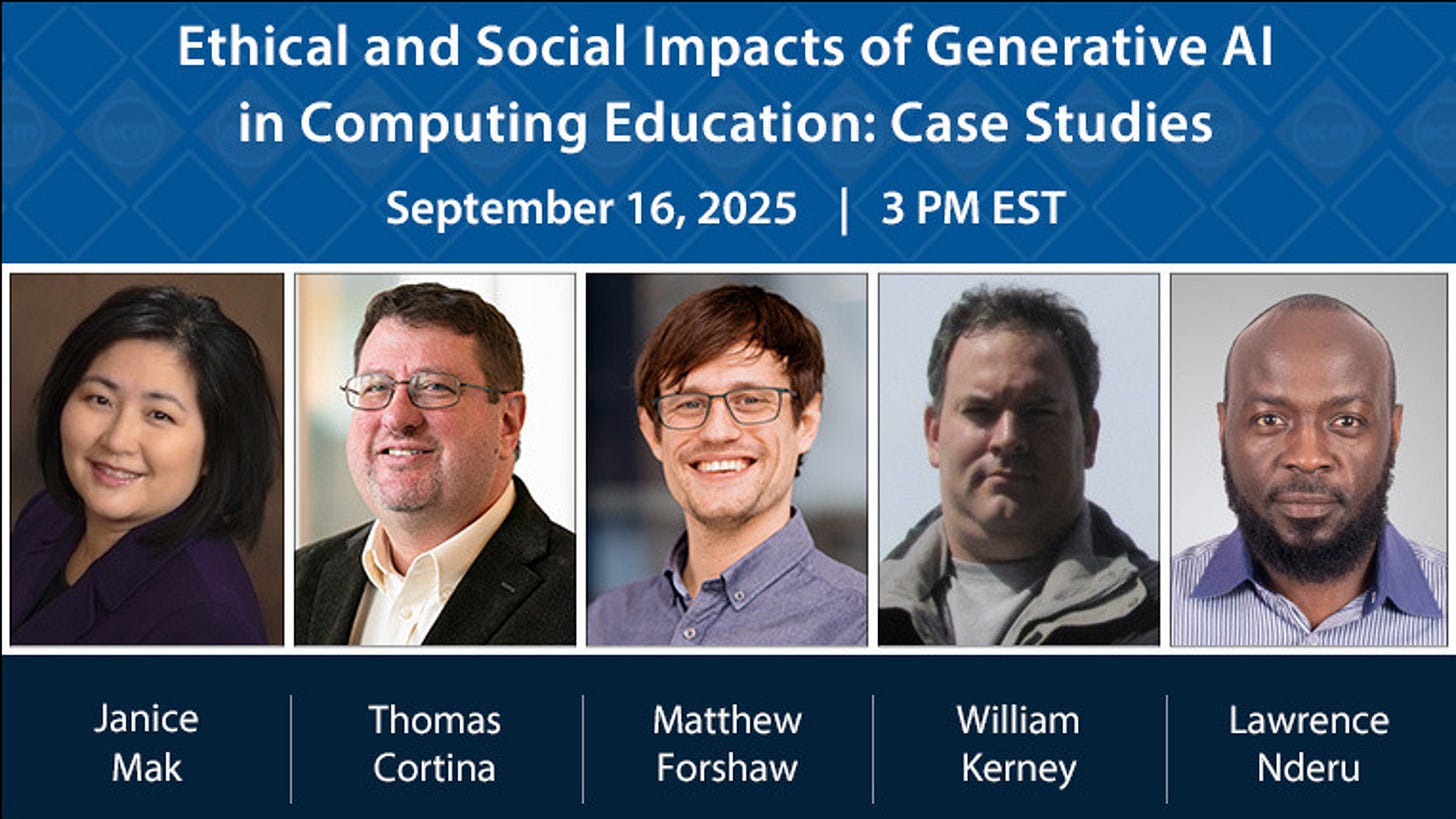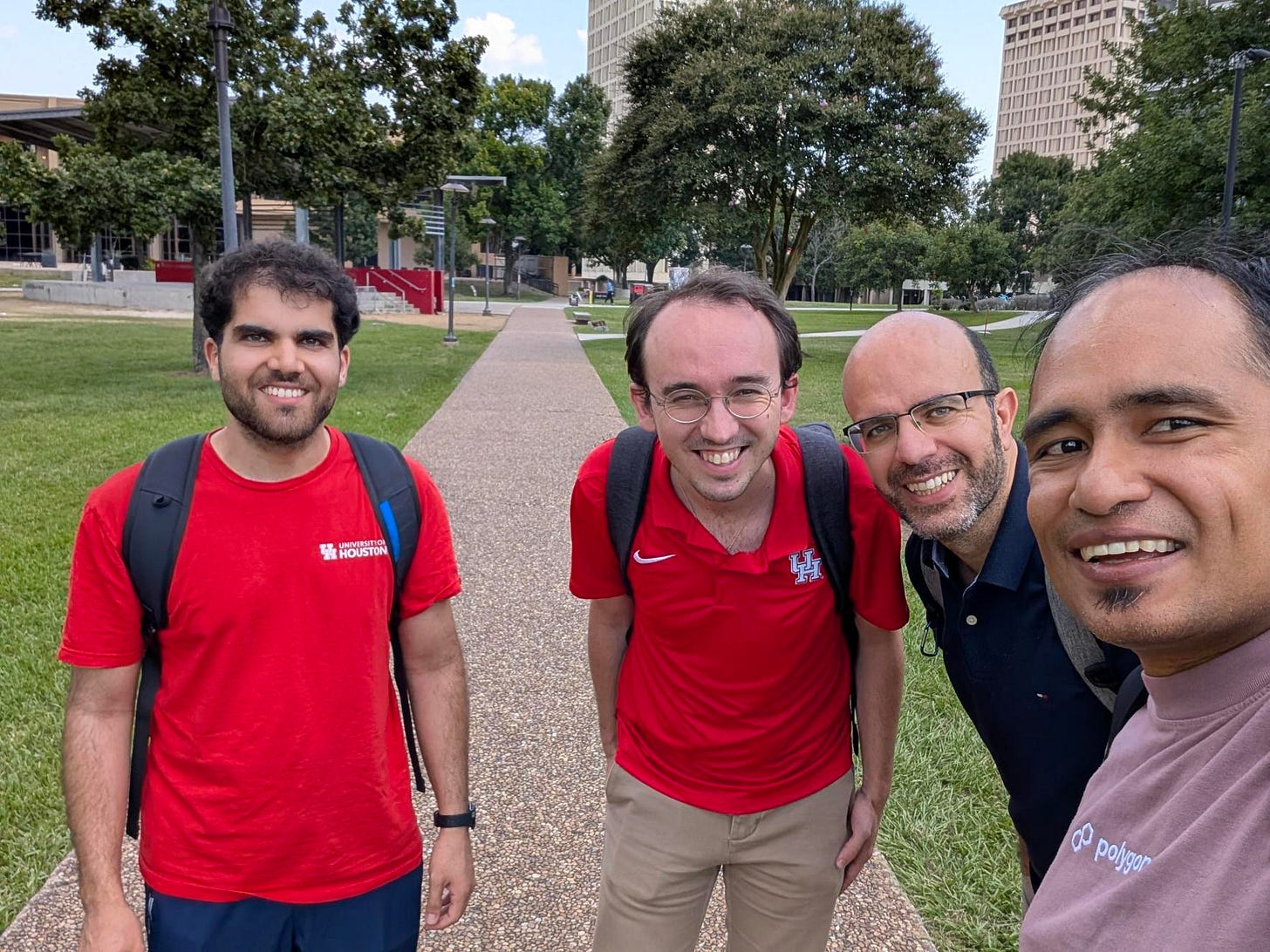#14 — LLMs hide complexity
Go deep and not stay on the surface (or layers of abstraction)
Why CS students need deep understanding
Claude Code, Cursor, and other tools have transformed the act of programming. They are an absolute game changer. That, for sure. And all of that is fantastic and will allow CS students to contribute value in professional settings much more quickly.
But I also think today the challenge is for students to understand the complexity that LLMs hide, to have an obsession with formal correctness, and not get carried away by the 'seems to work' mentality of vibe coding.
Why? The findings of this paper are brutally honest:
LLMs generate solutions that appear correct but fail under rigorous verification.
A successful test means nothing when we're talking about real correctness.
One of the paper's co-authors, Bertrand Meyer, still believes in formal verification. He uses AutoProof and Eiffel contracts to validate the corrections proposed by GPT-4o mini. It's like a Swiss watchmaker insisting on artisanal precision while the world buys Apple Watches.
Maybe the problem is that LLMs don't have enough Eiffel code in the data used for their training.
Maybe software engineering is no longer a technology of rigorous processes and formal verification, but rather a technology of mass generation and approximate validation.
Either way, my advice if you're a CS student would be: do not become an operator directing machines you don't understand, you shouldn't replace reasoning with statistical approximation, and the act of programming shouldn't be a dialogue with a black box. You should, ultimately, develop the capacity to go deep and not stay on the surface (or layers of abstraction) because CS fundamentals can be very useful to you because there comes a point where tool usage has limits, whether cost or customization, and knowing what happens behind the scenes will help you stay relevant long-term in this rapidly changing sector.
🔍 Resources for Learning CS
→ Josh Comeau's New Course
Josh W. Comeau has created a course for learning animation development. This isn't sponsored content—I'm sharing it because the course's landing page itself is full of amazing examples.
→ Grammarly for creating better AI prompts
With Pretty Prompt, you take any text—even if it's not really a prompt per se—and it transforms it into a clear and effective instruction to use in ChatGPT, Gemini, or Claude. The free plan gives you up to 3 prompts per day. My concern with this tool: delegating instruction writing might increase cognitive debt.
→ An amazing overview of the core Rust types and traits in a Mendeleev-like table
This is a clear visual guide to what’s truly built into the compiler. A great way to level up in Rust.
→ Stack Overflow finally enters the AI space
For those who used to spend a good amount of their time in Stack Overflow they’ve now entered the AI space. Smart move, but definitely late to the AI wave! Let’s see if it helps them bounce back.
→ Resource shared by Kristin Stephens-Martinez
GenAI’s impact on the social fabric of the learning environment is important to consider. Here is an ITiCSE ‘25 paper that interviewed students to understand the potential impact. The results are troubling and point to the possibility that GenAI is interfering with social interactions and leading to multiple negative consequences.
→ Authentication with drawings
A different kind of video that explains how authentication really works in real systems using Basic, Bearer, OAuth2, JWT, and SSO.
Two good bites from the industry
→ A Must-Listen on Robotics
Fascinating conversation here between Dwarkesh Patel and Sergey Levine, one of the world’s top robotics researchers and co-founder of Physical Intelligence. Some different views on autonomous robots. It's really good.
→ Greg and Thibault on OpenAI Podcast
What happens when AI becomes a true coding collaborator? OpenAI co-founder Greg Brockman and Codex engineering lead Thibault Sottiaux talk about the evolution of Codex—from the first glimpses of AI writing code, to today’s GPT‑5 Codex agents that can work for hours on complex refactorings. They discuss building “harnesses,” the rise of agentic coding, code review breakthroughs, and how AI may transform software development in the years ahead.
ACM Webinar Notes: GenAI Ethics in Computing Education
I was taking some notes from this webinar from ACM on case studies of the ethical and social impacts of generative AI in computing education, with global perspectives from three panelists: Bill Kerney (btw, his yt channel is full of interesting lectures), Lawrence Nderu and Matthew Forshaw.
Here are what for me have been the highlights of each presentation 👇
Bill Kearney presentation:
Bill says he's neither pessimistic nor optimistic about GenAI, but he regrets that 80% of his online Data Structure class was cheating using GenAI with a 33% failure rate, and only 10% of his in-person class cheated with a 5% failure rate.
Bill's goal is not to catch his students cheating but rather to make sure they learn the core concepts, and for this it's essential that they retain these fundamental skills in their brains, and that means dissuading them from copying using AI in foundation classes.
Bill gave some practical tips for detecting cheating: (1) embedding zero-point font text into the prompt (2) using AI detectors like GPTZero even though they are not very reliable (3) finding questions it can't answer (4) using vague or contextual instructions that any student in class would know, but AI has no idea about.
Bill mentioned the case of a student who passed the introductory C++ course and bragged on Reddit about having cheated and passed by copying with ChatGPT, but who now faced C++ 2 and didn't know where to start, which reflects that cheating doesn't help them.
Bill encouraged confronting students with AI's limits and stated that they hated it because it took them between 7 and 40 back-and-forth sessions to get it to answer correctly a medium-difficulty CS1 project that they could have written manually in less time.
Lawrence Nderu presentation:
Lawrence listed some ethical dimensions: bias & fairness (replication of societal inequalities), data sovereignty (who owns the data, whose voices count?), intellectual property (authorship, ownership, plagiarism concerns), privacy & security (leakage of sensitive information).
Lawrence said he's concerned about underrepresentation of African languages and contexts in AI datasets, which has risks like exclusion, stereotype reinforcement, or cultural erasure.
Lawrence proposed a framework for ethical GenAI based on 4 pillars: (1) Principles: beneficence, justice, accountability, transparency (2) context-sensitive AI ethics: tailored to cultural and societal values (3) multi-stakeholder governance: academia, industry, policymakers, communities (4) opportunity-centric AI: beyond compliance, towards human flourishing.
As future pathways, Lawrence wants to build inclusive datasets and benchmarks, strengthen ethical AI policies regionally and globally, embed AI literacy in education at all levels, and collaborate across borders for shared AI futures.
Lawrence ended his presentation saying that GenAI is rewriting human possibilities, ethical governance is not optional—it's foundational, social impact must be opportunity-driven not just risk-focused, and Africa and the Global South have a vital role in shaping the AI future.
Matt Forshaw presentation:
Matt shared interesting data showing that 52% (c.21 million) of the UK labour force is not meeting its full potential in terms of harnessing digital skills, including interacting with AI (digital literacy). He got this data from collaborative work between FutureDotNow and Lloyds Banking Group.
Matt reflected on the difficulty of balancing teaching ethical principles to students with real practice in companies, or between teaching values and what actually happens in professional settings where colleagues don't share them, or how new graduates will communicate AI outputs to leadership that has a very limited background in AI as a starting point.
Finally, he presented the AI skills for business competency framework, which has the ambition to increase the rate, scale and quality of upskilling and reskilling in AI technologies by ensuring businesses have an understanding of AI, access to resources to upskill in AI, and incentives to upskill in AI.
The Professor-Student Relationship
I listened carefully to this podcast episode in Spanish. It's a great diagnosis of the university education system, the professor-student relationship, youth in general, and the meaning of being an educator.
Here are my notes (translated to English):
If the university is a place where you have specialized people who enter into a kind of chain of research results, and on the other hand you have people who come to acquire a degree, but there's no educational relationship, no encounter, no community of conversation between professors and students, then what's essential to the university as an educational institution is missing.
Between professor and student there's a natural inequality, but they are friendships between unequals, therefore, they're governed by a different logic, but we can also call it friendship because it's a personal relationship. The educational relationship is one where the other person is the one who changes many times without realizing it or by bumping up against reality. Someone comes in a somewhat immature way, thinking they don't have much to learn, and the educational relationship is what puts them back in their place. Upon coming to know that one doesn't know, one reaches the measure by which one comes to know. The only thing you have to ask of the student is interest in knowing and healthy curiosity.
On the professor's part, time and generosity are needed, because moreover nowadays the university has become a hostile and competitive world. And trust, as in any human relationship. That the other trusts you and that you inspire trust. Either there's an attraction in the sense that I want to be with her, I'd like to talk with her, or the door to knowledge doesn't open. The professor shouldn't mind having to dedicate time to teaching students who still don't know anything, who are "ignorant." Students have to realize that the professor is interested in them, interested in them as people.
One of the great educational challenges is that students arrive with a superficial perspective on topics. In the sense of simplifying or reductionist. Good or bad, right or left, old or modern, which is partly normal due to the immaturity with which someone arrives at university. The exercise in great books seminar classes is to develop the capacity to go deep, to not stay on the surface.
The awareness the professor must have is that he's not capable of educating in the existential sense. That is, he's not capable of educating someone about what good is, what happiness is... Educating in that deep, existential sense is something that depends on both parties, where the professor, rather than marking out a stone path that one has to follow without straying from that path, creates the context where the student can grow. Creating that environment in the classroom.
Why should education awaken hope? If the educator doesn't have hope that the person can improve, can grow, can open themselves to truth, good and beauty, their task is in vain. The profession of educator has a special density, it involves you professionally: it's one where you enter into intimacy, into the sanctuary of the person, you're performing a task that really surpasses you.
Young people are still young people. It's proper to youth to be a moment of thinking about the future, about ideals, about the desire for good, truth, beauty. That attraction hasn't disappeared. There's a crust that hides it, in many ways, and it's very evident, but it's a relatively thin crust, that breaks through education.
When students are put in contact with good, with truth, with beauty, great books etc., they value it, they understand it, they appreciate it and it excites them. A professor knows their classes are working by how students look. That flash of surprise, of joy, of enthusiasm, that you see. They don't say it, but you see it. And that still happens.
🔍 Resources for Teaching in CS Education
→ CSEd ideas worth sharing
Teaching or mentoring students in Computer Science? Most explanations here are clearer than what you usually find around.
→ Convivial Classrooms and AI
Josh Brake shared here some ideas about creating convivial classrooms in the age of AI at an event hosted by the MIT Teaching + Learning Lab.
→ New Podcast: The Rest is Teaching
How can we improve the way we teach Computing? How can we make the subject more accessible, inclusive, equitable, ethical, interesting and relevant to learners of all ages, backgrounds and motivations? These are the big questions taking place in this new podcast called The Rest is Teaching: A Podcast for Computing Education Practitioners and Researchers.
🌎 Computing Education Community Highlights
Kevin Lin and Matt Wang are hosting virtual office hours throughout Fall 2025 to help computing instructors improve course accessibility. These drop-in sessions require no registration and aim to support instructors in setting and achieving accessibility milestones. Join them here for the next one, which will be Mon, Oct 6 from 9 AM to 11 AM.
The Luddy School of Informatics, Computing, and Engineering at IU Indianapolis is hiring a full-time Lecturer (Non-Tenure Track) and Rollins College in sunny Orlando (FL) is currently recruiting an Assistant Professor with an open specialization area.
Sara Hooshangi from Virginia Tech and her team are developing a validated concept inventory for Git. If you are a git expert or have expertise in teaching Git to beginners or experience using Git in other teaching capacities and you want to complete some surveys to help them with the study email Sara directly at shoosh@vt.edu and they will provide you with more information.
Just a reminder that the Nifty Assignments submission deadline is coming up, Thu Oct 2nd. The value of Nifty Assignments comes from the great ideas bubbling up from the community. The application is not too heavyweight - you need an assignment that you have given and was great. The details for submission are here.
New faculty position in Learning Sciences & Learning Technologies at EPFL.
🤔 Thoughts For You to Ponder…
This week's thought comes from Anastasiia Birillo, Head of Education Research Group in JetBrains Research. It's one that also happens to be very relevant to the topic of this post:
I believe that as AI grows, human expertise becomes even more valuable. Programming has changed a lot, and AI boosts productivity significantly, but the real question is: how do we teach the next generation of programmers in this new world? Should we just teach students how to interact with AI and stop there?
AI should be integrated into programming courses right from the start. Traditional teaching methods can’t ignore AI anymore. But that doesn’t mean students should simply rely on AI for answers or solutions. Our goal should still be to raise critical thinkers, not train people to just press buttons.
We also need to shift the focus from teaching students how to write code to teaching them how to read and understand it - whether it’s generated by AI or written by another person.
What does this look like in practice? For example, we can use AI tools to create personalized projects with errors based on mistakes students have made before. AI can act as a guide, offering suggestions to improve code without making changes itself. It can create custom videos to explain concepts a student is struggling with, or even ask students to fix poorly written AI-generated code. At the same time, we need to show real-world examples of how AI helps in the industry - while also making it clear that AI doesn’t do all the work.
You can read the whole post here. Got a thought? Leave a comment below.
📌 The PhD Student Is In
→ Thank You, Rabimba
It’s been such an honor working with Rabimba! I want to thank him for always being so supportive—I’ve learned so much from him. Wishing him all the best in his next adventure at PayPal!
→ Exciting News: Paper Accepted
Last week I forgot to mention this, but it looks like the work we've been doing in the research group is paying off, and it's always great to receive positive results. Excited to share that our paper “From Prompts to Propositions: A Logic-Based Lens on Student-LLM Interactions” has been accepted to Koli Calling 2025!
→ Building a tool for researchers
In this week's status meeting with my two advisors (Amin from UH and Michael from CMU), I showed them a demo of VideoToTXT, which is a tool for researchers to process high fidelity data I've been developing. It's basically to automate coding user interviews using GPT-4 Vision API while preserving human judgment (a ton of image processing dude!). The tool can process videos of about 1 hour (no more than 500MB) and is capable of extracting query logs in learning environments like search, AI tools, IDEs or videos. This next week my goal is to refine v1 towards one that preserves human judgment while leaving the more objective part to the LLM. An article that has been helpful for this iteration is this one by Zach Gates. With LLMs I have the same feeling: I want to delegate as many tasks as possible, but let's be realistic—we tend to underestimate human capabilities, and there are certain subjective tasks where human judgment is simply more accurate. I've also been thinking about implementing an LLM guardrail model that functions as a classifier.
🪁 Leisure Line
I had a great time last weekend at this American craft beer tasting. Pale Ale is definitely my favorite beer style. The Sierra Nevada seemed incredible to me. St. Bernardus is a fantastic beer too, and I'm sorry to its fans, but the Celebrator and North Coast aren't for me.
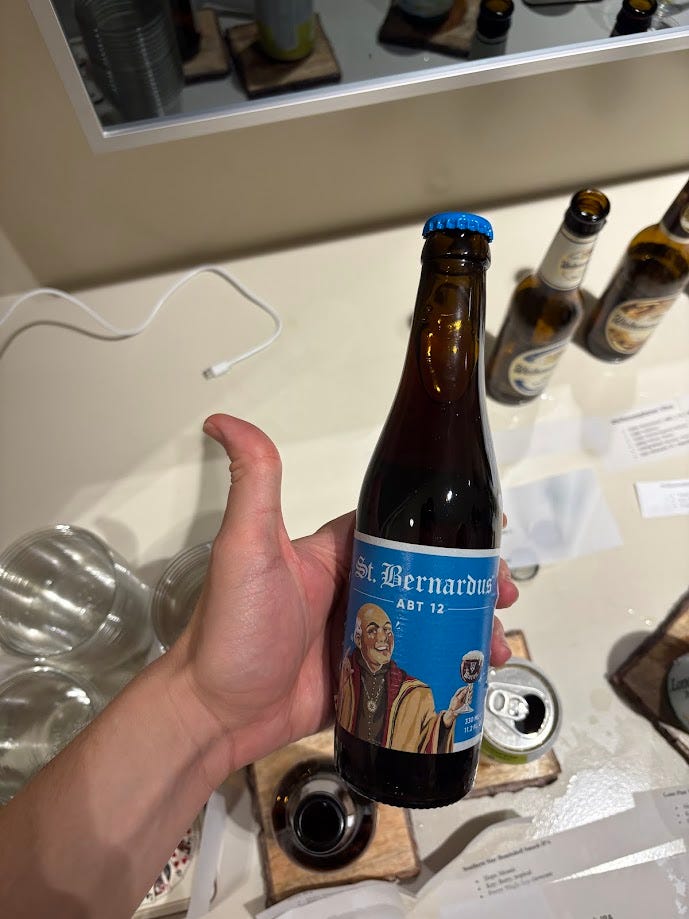
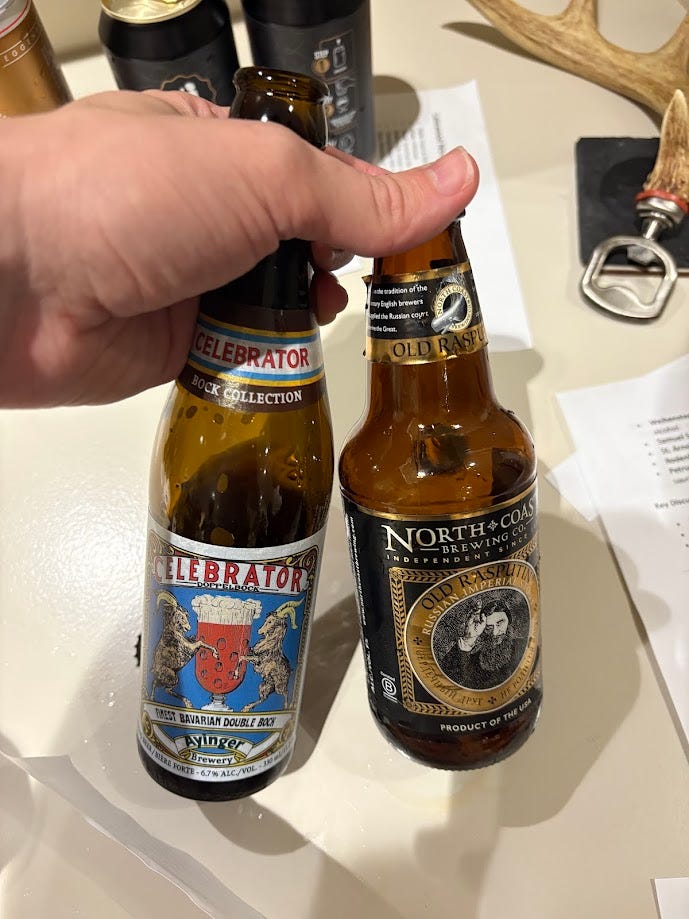
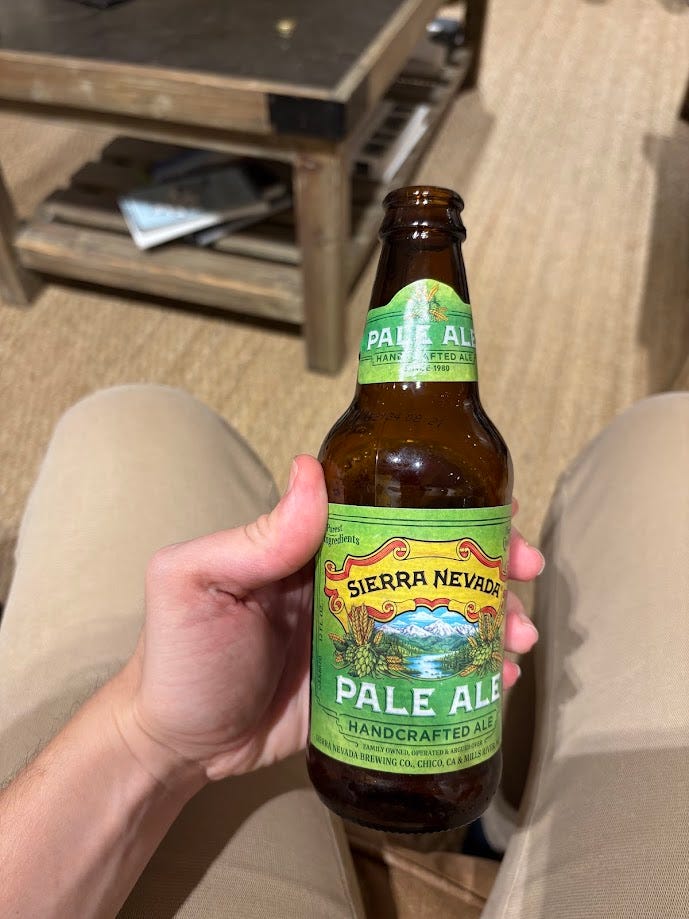

📖📺🍿 Currently Reading, Watching, Listening
I'm stuck on repeat with Ed Sheeran's new album. I love that he stepped out of his comfort zone to make different music, especially with Sapphire and its Indian influences, but that's not the only track I liked. I also really respect the rap in Opening, the positivity of Azizam, the beauty of Old Phone, the great ballads In Other Words, Camera, Heaven, and For Always, how catchy A Little More is, the epic feel of Slowly, and the lyrics in The Vow.
Of course Ed already did his tiny desk (alone). Such a talent.
After loving Ed Sheeran's new stuff so much, Chosic is the perfect tool for creating playlists with songs similar to those on the album. The system suggests related music and saves the playlist directly to your Spotify account.
Ice Merchants tells the story of a father and his young son as they confront an unspoken grief. Absence fills everything, yet there is still room for work, embraces, bewilderment over what they've lost, and hope for the future. All of this is conveyed without dialogue, accompanied by a beautiful soundtrack composed by the director and creator of this short film, João Gonzalez.
My Ignatius Catholic Study Bible just dropped! It is a game-changer. Lots of helpful footnotes, essays, charts, maps, word studies, and citations from the CCC and even the church fathers. It’s impossible not to admire the care they put into every detail. Thank you for your hard work Scott Hahn and team. It’s impossible not to admire the care they put into every detail.
Quotable 💬
It is not your business to succeed, but to do right; when you have done so, the rest lies with God.
― C.S. Lewis
That's all for this week. Thank you for your time. I value your feedback, as well as your suggestions for future editions. I look forward to hearing from you in the comments.
Quick Links 🔗
🎧 Listen to Computing Education Things Podcast
📖 Read my article on Vibe Coding Among CS Students
💌 Let's talk: I'm on LinkedIn or Instagram





